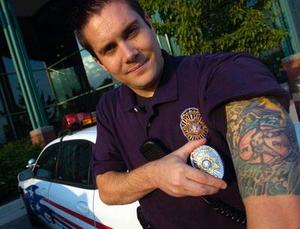Law enforcementPhoenix police banned from sporting tattoos
In an effort to present a more professional image, an increasing number of police departments across the United States are requiring officers to cover up their tattoos; the Phoenix police department recently began requiring its officers to cover its tattoos, a move that has generated criticism due to the intense Arizona heat

An increasing number of departments ban tattoos // Source: philosophistry.com
n an effort to present a more professional image, an increasing number of police departments across the United States are requiring officers to cover up their tattoos.
The Phoenix police department recently began requiring its officers to cover its tattoos, a move that has generated criticism due to the intense Arizona heat.
“It’s hot out there,” said Mark Spencer, the president of the Phoenix Law Enforcement Association, which is challenging the new policy. “Imagine having to wear long sleeves along with body armor, a gun belt and having to get in and out of a police car 50 times every day.”
The new restrictions will take effect on 28 August and prohibit officers from displaying tattoos on their arms that are bigger than a three-by-five index card and tattoos cannot be visible on the face, neck, or hands. Furthermore tattoos that depict nudity, contain vulgar language, or offensive images like swastikas, pentagrams, or KKK images are strictly forbidden along with tongue rings and other forms of body modification like horns.
The policy also requires that photographs of visible tattoos be included in an officer’s file and that any additional tattoos be reviewed by department officials.
It is unclear how many of Phoenix’s 1,187 officers will be affected by the new policy, but officials insist that despite the increasing ubiquity of tattoos, they still carry criminal connotations and are not appropriate for law enforcement officials.
“We’re not saying a person with a tattoo is bad,” explained Sergeant Tommy Thompson, a spokesman for the department. “We just want to project a professional image. We don’t want to give anyone any reason to distrust us.”
Spencer disagrees with the department’s assessment and maintains that cultural associations regarding tattoos have changed.
“I can bring my daughter down to Toys “R” Us and buy a Tattoo Barbie,” he said. “My kids, one of their favorite shows is “LA Ink.” Tattoos are not for me. But does this policy make the community any safer?”
Spencer added that if police officers are required to cover up their tattoos, then the policy should also apply to firefighters, water meter readers, and the staff of the city manager’s office, which approved the new policy.
Jeffrey Yzquierdo, who has been on the force for eleven years and has a full-sleeve tattoo covering one of his arms from his elbow to his wrist, says that while his ink generates positive reactions, he gets even more negative ones from the community.
In contrast another tattooed officer, who preferred to stay anonymous, said that tattoos are a bridge for officers to connect with the community.
“It gives us a sense of humanity,” the three year veteran said. “We’re normal people just like everyone else.”
For those with visible tattoos, the department recommends wearing long-sleeved shirts or using flesh-colored wraps, bandages, or make-up to hide them.
